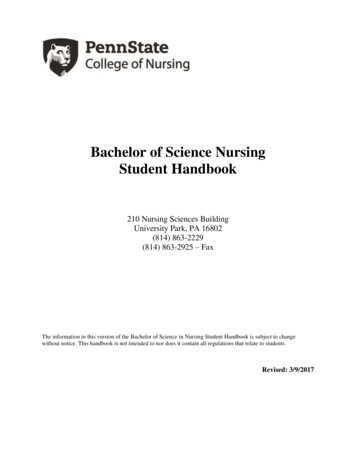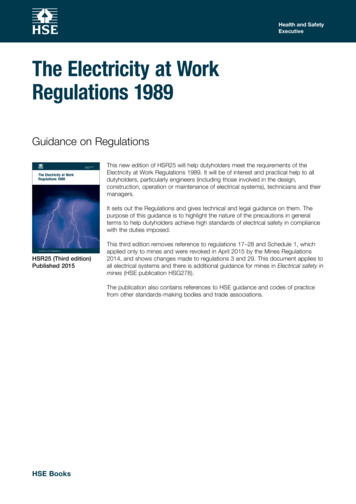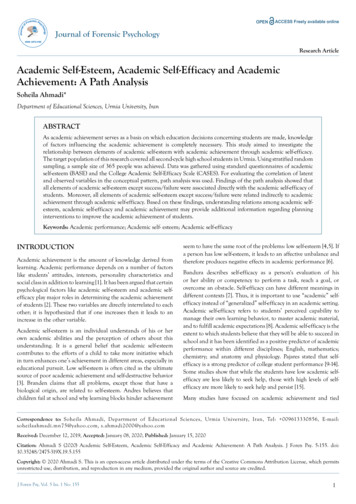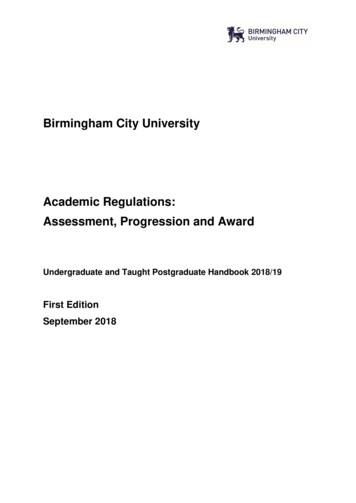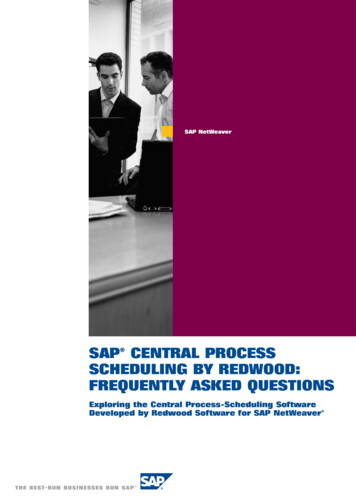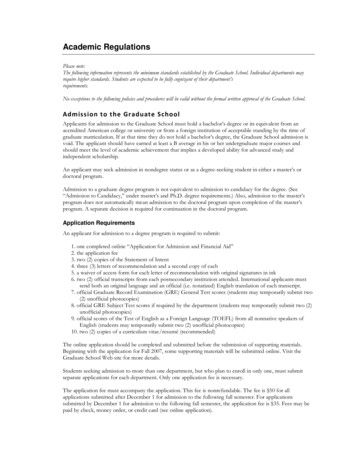
Transcription
Academic RegulationsPlease note:The following information represents the minimum standards established by the Graduate School. Individual departments mayrequire higher standards. Students are expected to be fully cognizant of their department’srequirements.No exceptions to the following policies and procedures will be valid without the formal written approval of the Graduate School.Admission to the Graduate SchoolApplicants for admission to the Graduate School must hold a bachelor’s degree or its equivalent from anaccredited American college or university or from a foreign institution of acceptable standing by the time ofgraduate matriculation. If at that time they do not hold a bachelor’s degree, the Graduate School admission isvoid. The applicant should have earned at least a B average in his or her undergraduate major courses andshould meet the level of academic achievement that implies a developed ability for advanced study andindependent scholarship.An applicant may seek admission in nondegree status or as a degree-seeking student in either a master’s ordoctoral program.Admission to a graduate degree program is not equivalent to admission to candidacy for the degree. (See“Admission to Candidacy,” under master’s and Ph.D. degree requirements.) Also, admission to the master’sprogram does not automatically mean admission to the doctoral program upon completion of the master’sprogram. A separate decision is required for continuation in the doctoral program.Application RequirementsAn applicant for admission to a degree program is required to submit:1. one completed online “Application for Admission and Financial Aid”2. the application fee3. two (2) copies of the Statement of Intent4. three (3) letters of recommendation and a second copy of each5. a waiver of access form for each letter of recommendation with original signatures in ink6. two (2) official transcripts from each postsecondary institution attended. International applicants mustsend both an original language and an official (i.e. notarized) English translation of each transcript.7. official Graduate Record Examination (GRE) General Test scores (students may temporarily submit two(2) unofficial photocopies)8. official GRE Subject Test scores if required by the department (students may temporarily submit two (2)unofficial photocopies)9. official scores of the Test of English as a Foreign Language (TOEFL) from all nonnative speakers ofEnglish (students may temporarily submit two (2) unofficial photocopies)10. two (2) copies of a curriculum vitae/resumé (recommended)The online application should be completed and submitted before the submission of supporting materials.Beginning with the application for Fall 2007, some supporting materials will be submitted online. Visit theGraduate School Web site for more details.Students seeking admission to more than one department, but who plan to enroll in only one, must submitseparate applications for each department. Only one application fee is necessary.The application fee must accompany the application. This fee is nonrefundable. The fee is 50 for allapplications submitted after December 1 for admission to the following fall semester. For applicationssubmitted by December 1 for admission to the following fall semester, the application fee is 35. Fees may bepaid by check, money order, or credit card (see online application).
Unless otherwise specified, the application deadline is January 15 for admission and financial aid for the fallsemester, and November 1 for the spring semester, though some departments have earlier deadlines. Only afew departments offer spring admission; therefore, applicants who wish to begin in the spring are advised toconsult the department.Beyond these Graduate School admission requirements for all graduate departments and programs, particularprograms may require personal interviews and/or submission of special materials such as writing samples orportfolios. Consult the specific department in this regard and submit one (1) copy of each required item to theGraduate School.The Graduate Record Examination (GRE) is offered at sites in the United States and abroad. The annualschedules and other information about the GRE can be obtained online at http://www.gre.org or fromEducational Testing Service (ETS), Graduate Record Examination, Box 6000, Princeton NJ 08541-6000, USA.If you need to call about the GRE, telephone the Educational Testing Service at (609) 771-7670.The Test of English as a Foreign Language (TOEFL) is offered several times each year at sites in the UnitedStates and abroad. Foreign students, except those noted above, must submit TOEFL scores as part of theirapplication to demonstrate a sufficient command of English to meet the requirements of their field. If notavailable locally, the annual schedules and other information about the TOEFL can be obtained online athttp://www.toefl.org or from Educational Testing Service (ETS), TOEFL, Box 6151, Princeton NJ 085416151, USA. If you need to call about the TOEFL, telephone the Educational Testing Service at (609) 771-7100.Admission to Multiple Degree ProgramsAn applicant who seeks admission to more than one master’s degree program in the Graduate School in orderto earn two degrees, or an applicant who seeks admission to a degree program in the Graduate Schoolconcurrently with a degree program in another school in the University (i.e., Law School or Mendoza Collegeof Business) must submit a separate and complete application for each program. The applicant must also beaccepted by each of the cooperating departments. The Graduate School will consider only applicants whosepast academic performance indicates the potential for success in each of the programs. In consultation with theappropriate advisers from each unit, the applicant will select a plan of study acceptable to all units. TheGraduate School must approve the written plan of study before the student may begin the program. No morethan nine credit hours of classes from any one master's degree may be counted toward any other master'sdegree.Admission to Joint Degree ProgramsIt is possible for a student to pursue a program of study combining two programs and leading to a joint degree.An applicant who seeks to earn a joint degree, either master’s or Ph.D., must submit a separate and completeapplication to each program and be accepted by both. The relevant departments must agree upon a plan ofstudy defining what will constitute the joint degree program, and the approved written plan must be on filewith the Graduate School before the student may begin the program.Nondegree ApplicantsAn applicant for admission to a nondegree program is required to submit one completed Graduate Schoolapplication and two official transcripts from each postsecondary institution attended. (When possible,transcripts should be sent directly to the Graduate School by the institution.) Particular departments mayrequire personal statements detailing the applicant’s graduate plans and expectations.A nondegree applicant may seek admission as a departmental nondegree student or as an unclassified, visiting,or auditing student in the Graduate School.A departmental nondegree student is one who has been admitted to a department but does not seek anadvanced degree from the University. An applicant with degree intent who lacks one or more admissionrequirements may be admitted temporarily to this nondegree status at the discretion of the department andwith the approval of the associate dean for graduate admissions. The student may register for one to 12 credit
hours in any graduate courses for which he or she meets the course prerequisites. However, no student initiallyadmitted to nondegree status will be admitted to degree status until all admission requirements have beensatisfied. No more than 12 credit hours earned by a student while in a nondegree status may be counted towarda degree program. Admission as a departmental nondegree student does not guarantee later admission as adegree-seeking student.An unclassified student is one who is admitted to the Graduate School in a nondegree status, but who is not amember of a particular department. Such a student may, with the approval of the Graduate School, takecourses in any graduate department, subject to approval by the department. This category is usually open tonondegree students who wish to take courses in more than one department or students who have completedtheir degree programs, but wish to continue in the University in graduate student status. No more than 12credit hours earned by a student while in a nondegree status may be counted toward a degree program.Admission as an unclassified nondegree student does not guarantee later admission as a degree-seeking student.A visiting student is normally a degree student in another university who enrolls for credit in selected courses atNotre Dame. Unless otherwise arranged by the home university and Notre Dame, the visiting student isconsidered a nondegree student at Notre Dame and follows the same application and enrollment procedures asa nondegree student.An auditor is a nondegree student who meets the course prerequisites but receives no academic credit. With thepermission of the instructor and the department chair, a degree student also may audit courses. Audited coursesmay be recorded on a student’s permanent record only if the student requests the instructor to record it at thebeginning of the semester and if he or she attends the course throughout the entire semester. A recorded auditis graded V. Incomplete audits are not recorded. The audit grade of V cannot be changed to a credit grade.In the academic year, full-time graduate students may audit courses without charge. Part-time graduate studentswho audit courses will be charged the normal audit fee of one-half the current credit hour fee.In the summer session, there is no free audited course. Any course taken or audited in the summer session willbe charged the full price.AcceptanceOfficial acceptance to the Graduate School in the academic year is granted only by the associate dean.Applicants will be informed officially of the results of their application by a letter from the associate dean forgraduate admissions. Applicants who intend to accept offers of admission are required to confirm theiracceptance by returning the appropriately completed form that is supplied with an offer of admission.Enrollment in the UniversityOnce admitted, all degree and nondegree graduate students must enroll and register each semester at the datesand times announced by the University Registrar.Any admitted student who fails to register and enroll for one semester or more must apply for readmissionupon return. (See “Continuous Enrollment,” below.)Full-time and Part-time StatusA full-time student is one who is working full time toward his or her degree objective. The student’sdepartment is responsible for determining who is a full-time student, and who is otherwise a part-time student.All degree-seeking students are expected to maintain full-time status and to devote full time to graduate study.No degree student may hold a job, on or off campus, without the express permission of his or her departmentand the Graduate School.A nondegree student must register for at least nine credit hours per semester, or six in the summer session, toclaim full-time status.
Academic Good StandingContinuation in a graduate degree program or in nondegree status, admission to degree candidacy, andgraduation require maintenance of at least a 3.0 (B) cumulative grade point average (G.P.A.). A student may bedismissed from the department or program if the G.P.A. in any one semester is below 2.5 or if the G.P.A. isbelow 3.0 for two consecutive semesters. Some departments require higher averages for enrollment andsupport continuance.An adequate G.P.A. is only one factor taken into consideration in determining a student’s qualifications for anadvanced degree. Degree students should be aware of their department’s performance criteria. The departmentand the Graduate School annually evaluate each graduate student’s overall performance on the basis of thesecriteria.A student must be in academic good standing to be eligible for new or continued financial support.Continuous EnrollmentAll students must enroll each semester in the academic year and register for at least one credit hour persemester to maintain student status. Continuous enrollment is met normally by both enrollment in theUniversity and registration in a graduate-level course relevant to the student’s program. A student who isconcurrently pursuing degrees in the Graduate School and in another school in the University meets thecontinuous enrollment requirement by registering for a course in either program. Any exception to this rule,including a leave of absence, must be approved by the Graduate School. (See “Leave of Absence,” below.)Degree students who have completed the course work requirement for their degree must register for at leastone credit hour per semester, including the final semester or summer session in which they receive their degree.This credit hour should consist of either resident or non-resident thesis or dissertation research within theirdepartment. These students may be considered full-time students whether or not they are in residence.Students not in residence and taking one credit hour pursuant to continuous enrollment requirements arecharged a special registration fee.A student who fails to enroll and register for one semester or more must apply for readmission upon return.Continuing students (i.e., degree-seeking students who are eligible to continue their studies in the fall semester)may have access to University facilities and services from May through August without enrolling and registeringfor academic credit in the summer session.Leave of AbsenceFor exceptional reasons and on the recommendation of the department, a student in good academic standingmay request a leave of absence for a maximum of two consecutive semesters. A request for a leave of absencemust be made before the semester in which the leave is taken, and all leaves of absence must be approved bythe Graduate School. If, for some urgent reason, a student is allowed to leave the University after the beginningof the semester, the withdrawal procedure below must be followed. If at the end of the leave of absence periodthe student does not return, the student is considered terminated. Application for readmission is required if thestudent wishes to return.In the case of a medical leave of absence, clearance from the University Health Center is required prior toreadmission.Medical Separation from Academic DutiesStudents enrolled in the Notre Dame Graduate School who wish to temporarily interrupt their programs formedical reasons must apply to the Graduate School. Students are eligible under this policy if they have a“serious medical condition.” For purposes of this policy, “serious medical condition” means a medicalcondition that (1) requires multiple day hospitalization OR (2) renders the student unable to engage incoursework and all other Graduate School-related duties for a period of at least ten (10) calendar days.Certification by a physician that the student has a serious medical condition as defined in this policy must besubmitted to the Graduate School no less than three months prior to the separation period (for childbirth and
other predictable requests) or as soon as the need is foreseen (for emergency requests). In situations involvingchildbirth, the separation period will generally begin on the actual date of childbirth; in all cases, regardless ofthe nature of the medical condition, the duration of the separation will be as certified by the physician up to amaximum of six weeks. Students may utilize this medical separation policy two non-consecutive times duringtheir graduate studies. Should students need more than six weeks at any one time, they must withdraw fromthe University. Leaves of absence for one semester or more for medical or other reasons are governed by theGraduate School Leave of Absence policy.Full-time degree-seeking students in their sixth year of study or less who are receiving financial aid from theGraduate School or external funds will receive a stipend equal to their normal stipend during their period ofseparation, for a maximum of six weeks paid by the Graduate School. Students will retain their tuitionscholarships, access to on-campus medical facilities, and all other resources available to students during theentire separation period (up to six weeks). Students also will be deemed “continuously enrolled” at theUniversity during the entire period of separation.Teaching Assistant and Research Assistant duties will cease at least during the period of separation. Studentsare responsible for making arrangements, through their departments, to cover their duties. Students takingclasses will be required to make arrangements with individual course instructors for completion of any coursesin progress during the leave. Students will be granted the option to re-schedule exams, extend candidacydeadlines or other deadlines not discussed herein. Students are responsible for making arrangements toreschedule exams, extend deadlines and to make up other work not discussed herein. Unlike a regular onesemester leave, time off in conjunction with this policy will count towards the students’ degree time limit ofeight years and university-sponsored funding cap of six years.Withdrawal from the ProgramTo withdraw from the University before the end of the semester, a student must inform the department andthe Graduate School as well as complete the notice of withdrawal. (Seehttp://registrar.nd.edu/Separation Form/form.html.) For information on refunds, refer to “Tuition andExpenses.”Upon approval of the withdrawal, the University enters a grade of W for each course in which the student wasregistered. If a student drops out of the University without following the procedure described above, a grade ofF is recorded for each course.The credit for any course or examination will be forfeited if the student interrupts his or her program of studyfor five years or more.The University reserves the right to require the withdrawal of any student when academic performance, healthstatus, or general conduct may be judged clearly detrimental to the best interests of either the student or theUniversity community.Access to Computing ServicesThe University of Notre Dame NetID accounts and related services are intended for faculty, staff, andcurrently registered and enrolled students. "A student must register and enroll at the dates and times announcedby the Registrar" (Academic Code 4.1). A student who fails to register and enroll by the announced date willforfeit the right to access his or her NetID account and related services. University computing resourcessupplied by way of the NetID are normally available to a student for up to 60 days after his or her graduationdate. A student granted a leave-of-absence would normally retain access to University computing services forup to two semesters. A student who is separated from the University due to an academic suspension, academicdismissal, or withdrawal will no longer have access to University computing services, unless an extension hasbeen approved by the dean of his or her college. A student attending Notre Dame for the summer only, with anondegree seeking status, will normally retain access to University computing service for up to 60 days after theAugust graduation date. A student who is separated from the University for other reasons will no longer haveaccess to University computing services.
Registration and CoursesMaximal RegistrationDuring each semester of the academic year, a graduate student should not register for more than 15 credithours of graduate courses, i.e., the 60000 through 90000-level courses. In the summer session, a graduatestudent should not register for more than 10 credit hours.Course NumbersCourses numbered 60000 – 69999 are typically first-level graduate courses. Qualified advanced undergraduatesmay be admitted to these classes with the permission of the instructor and the approval of the chair. Coursesnumbered 70000 and above are advanced graduate courses open only to graduate students who havecompleted the prerequisites.The advanced undergraduate courses numbered 40000 – 59999 may, with the approval of the department chairand the Graduate School, be taken to satisfy up to 10 hours of graduate credit requirements. Departments mayplace additional constraints on the use of 40000 – 59999 level courses to meet their degree requirements.No graduate credit is allowed for courses below the 40000 level.Add/Drop PolicyA student may add courses through the first seven class days of the semester. A student may add courses afterthis time only on recommendation of the department and with approval of the Graduate School.A student may drop courses at their discretion through the first seven class days of the semester. To drop acourse after this period and up to the midsemester point (see the Graduate School calendar for the exact date),a student must have the approval of the chair of the department offering the course, of his or her adviser, andof the Graduate School; however, no tuition adjustment will be made after the seventh class day of thesemester. A course may be dropped after the midsemester point only in cases of serious physical or mentalillness. Courses dropped after this period will be posted on the student’s permanent record with the grade ofW.A course taken for credit can be changed to an audit course after the midsemester point only in cases of seriousphysical or mental illness.GradesListed below are graduate grades and the corresponding number of quality points per credit hour.AAB BBC CFINRSUVW43.6673.33332.6672.333200 (Until Incomplete is removed)Not reported0 Satisfactory0 Unsatisfactory0 Auditor (graduate students only)0 Discontinued with permissionQuality point values are used to compute the student’s G.P.A. The G.P.A. is the ratio of accumulated earnedquality points to the accumulated earned semester credit hours. G.P.A. computation takes into account onlythose grades earned in Notre Dame graduate courses by students with graduate status at Notre Dame. For
courses taken in a department or college in the University, but outside the Graduate School, or taken outsidethe University, the grade will not be included in the G.P.A. computation.The grades of C- and D are not awarded in the Graduate School.A student receives the temporary grade of I when, for acceptable reasons, he or she has not completed therequirements for a 60000- or higher-level graduate course within the semester or summer session. No grade ofI can be given for courses below the 60000 level or to graduating students in the final semester or final summersession of a terminal degree program.The student then must complete the course work for a grade prior to the beginning of the final examinationperiod of the next semester in which the student is enrolled. If a student receives an I (Incomplete) for asummer session course, he or she must complete the course work for a grade before the final examinationperiod begins for the next semester or summer session (whichever comes first) in which the student is enrolled.The University temporarily computes this grade as the equivalent of an F in calculating the G.P.A. When thestudent fulfills the above requirements, the I is replaced by the new grade. Faculty will be given 30 days fromthe last day of classes to turn in the grade change form to the Graduate School. Should the student notcomplete the course work as required, the I will convert to an F on the transcript.The department and the Graduate School will review a student who receives more than one I in a semester oran I in two or more consecutive semesters, to determine his or her eligibility for continued support andenrollment.The grades of S and U (Satisfactory and Unsatisfactory) are used in courses without semester credit hours, aswell as in research courses, departmental seminars, colloquia, workshops, directed studies, field education, andskills courses. These courses, if given the grade of S, do figure in a student’s earned semester credit-hour totalbut do not figure in the computation of the G.P.A. A grade of U will not count toward the student’s earnedsemester credit-hour total, nor will it figure in the computation of the G.P.A.The grade of V (Auditor) has neither quality-point nor credit-hour value. It is the only grade available to theregistered auditor. The audit must be requested before the seventh class day of the semester; the auditor shouldattend the course throughout the entire semester, and it is made part of his or her permanent record. The gradeof V cannot be changed to a credit-earning grade. Information about declaring an audit is posted athttp://registrar.nd.edu/audit.shtml.The grade of W (Discontinued with permission) is given for a course that a student is allowed to drop after themidsemester point.Transfer CreditsA department may accept course work completed at another accredited university toward meeting its degreerequirements. A student may transfer credits earned at another accredited university only if: (1) the student is indegree status at Notre Dame; (2) the courses taken are graduate courses appropriate to the Notre Damegraduate program and the student had graduate student status when he or she took these courses; (3) thecourses were completed within a five-year period prior to admission to a graduate degree program at NotreDame or while enrolled in a graduate degree program at Notre Dame; (4) grades of B (3.0 on 4.0 scale) orbetter were achieved; and (5) the transfer is recommended by the department and approved by the GraduateSchool.These five requirements also apply to the transfer of credits earned in another program at Notre Dame.The University considers a request for credit transfer only after a student has completed one semester in aNotre Dame graduate degree program and before the semester in which the graduate degree is conferred. Theuniversity of origin must submit two transcripts directly to the Notre Dame Graduate School. Credits notearned on the semester system, such as trimester and quarter-hour credits, will be transferred on a pro ratabasis.
A student transferring from an unfinished master’s program may not transfer more than six semester credithours into either a Notre Dame master’s or Ph.D. program.If the student has completed a master’s or Ph.D. program, he or she may transfer up to nine semester credithours to a Notre Dame master’s program and up to 24 semester-credit hours to a Notre Dame Ph.D. program.Occasionally, a student may need to do dissertation research at another institution. Normally, the studentwould register for the appropriate number of credit hours of research at Notre Dame. If the student does notenroll at Notre Dame and expects to count research hours earned elsewhere toward the Notre Dame degree,the student must have the approval of the department and the Graduate School in advance. The Universityrequires similar prior approval for formal courses taken elsewhere and applied to the degree program. Twentyfour credit hours, including research credit hours, is the maximum acceptable for transfer into a Notre Damedoctoral program.No grades of transferred courses are included in the student’s G.P.A.Academic IntegrityIntegrity in scholarship and research is an essential characteristic of our academic life and social structure in theUniversity. Any activity that compromises the pursuit of truth and the advancement of knowledge besmirchesthe intellectual effort and may undermine confidence in the academic enterprise. A commitment to honesty isexpected in all academic endeavors, and this should be continuously emphasized to students, researchassistants, associates, and colleagues by mentors and academic leaders.The procedures for ensuring academic integrity in the Graduate School are distinct from those in theUndergraduate Code of Honor. The following apply to both degree-seeking and non-degree-seeking students.Violations of academic integrity may occur in classroom work and related academic functions or inresearch/scholarship endeavors. Classroom-type misconduct includes the use of information obtained fromanother student’s paper during an examination, plagiarism, submission of work written by someone else,falsification of data, etc. Violation of integrity in research/scholarship is deliberate fabrication, falsification, orplagiarism in proposing, performing, or reporting research or other deliberate misrepresentation in proposing,conducting, reporting, or reviewing research. Misconduct does not include errors of judgment, errors inrecording, selection, or analysis of data, differences in opinions involving interpretation, or conduct unrelatedto the research process. Misconduct includes practices that materially and adversely affect the integrity ofscholarship and research.Any person who has reason to believe that a violation of this policy has occurred shall discuss it on aconfidential basis with the department chair or director of the appropriate institute. If a perceived conflict ofinterest exists between the chair/director and the accused, the next highest academic officer shall be notified ofthe charge. The chair/director shall evaluate the allegation promptly. If it is determined that there is nosubstantial basis for the charge, then the matter may be dismissed with the fact of dismissal being made knownto the complainant and to the accused if he or she is aware of the accusation. A written summary of charges,findings, and actions shall be forwarded to the dean of the Graduate School as a matter of documentation.Otherwise, the chair will select an impar
A visiting student is normally a degree student in another university who enrolls for credit in selected courses at Notre Dame. Unless otherwise arranged by the home university and Notre Dame, the visiting student is considered a nondegree student at Notre Dame and follows the same application and enrollment procedures as a nondegree student.



